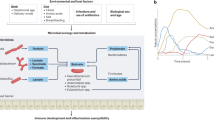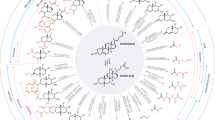Abstract
DEFICIENCY of thiamine may be prevented in rats if they are given sorbitol. Administration of sorbitol to deficient rats cures the deficiency; withdrawal of the sorbitol leads to deficiency1. All these results have now been found also in mice (Fig. 1). Mice, like rats, also showed an enlarged cæcum when they were fed diets with sorbitol (Table 1).
This is a preview of subscription content, access via your institution
Access options
Subscribe to this journal
Receive 51 print issues and online access
$199.00 per year
only $3.90 per issue
Buy this article
- Purchase on Springer Link
- Instant access to full article PDF
Prices may be subject to local taxes which are calculated during checkout
Similar content being viewed by others
References
Morgan, T. B., and Yudkin, J., Nature, 180, 543 (1957).
Morgan, T. B., and Yudkin, J., Chem. and Indust., 37 (1959).
Barnes, R. H., Fiala, G., McGehee, B., and Brown, A., J. Nut., 63, 489 (1957).
Author information
Authors and Affiliations
Rights and permissions
About this article
Cite this article
MORGAN, T., YUDKIN, J. Thiamine-sparing Action of Sorbitol in Rats and Mice. Nature 184, 909–910 (1959). https://doi.org/10.1038/184909a0
Issue Date:
DOI: https://doi.org/10.1038/184909a0
This article is cited by
-
Zur Frage der Vitaminversorgung durch die Darmflora
Zeitschrift für Ernährungswissenschaft (1964)
-
Thiamine-sparing Action of Mustard and Role of Coprophagy
Nature (1963)
-
Einfluß des Sorbits auf die intestinale Vitaminsynthese bei der Ratte
Pflügers Archiv - European Journal of Physiology (1963)
-
�ber die ?Vitamin-sparende Wirkung? des Sorbits beim Menschen
Klinische Wochenschrift (1962)
-
Tierexperimentelle Untersuchungen zur Frage des Ersatzes von Vitamin B1 durch Sorbit
Zeitschrift für Die Gesamte Experimentelle Medizin (1960)
Comments
By submitting a comment you agree to abide by our Terms and Community Guidelines. If you find something abusive or that does not comply with our terms or guidelines please flag it as inappropriate.



